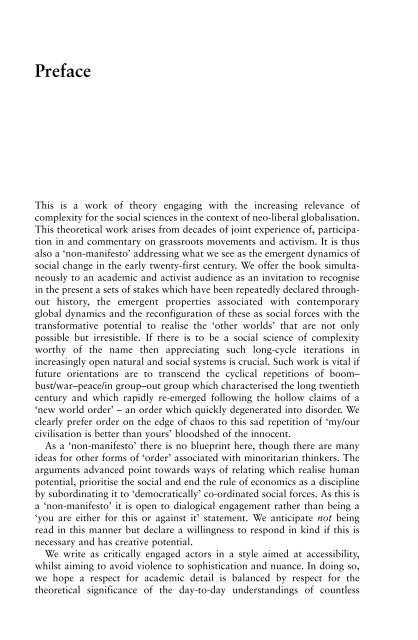Complexity and Social Movements: Multitudes at the Edge of Chaos ...
Complexity and Social Movements: Multitudes at the Edge of Chaos ...
Complexity and Social Movements: Multitudes at the Edge of Chaos ...
You also want an ePaper? Increase the reach of your titles
YUMPU automatically turns print PDFs into web optimized ePapers that Google loves.
Preface<br />
This is a work <strong>of</strong> <strong>the</strong>ory engaging with <strong>the</strong> increasing relevance <strong>of</strong><br />
complexity for <strong>the</strong> social sciences in <strong>the</strong> context <strong>of</strong> neo-liberal globalis<strong>at</strong>ion.<br />
This <strong>the</strong>oretical work arises from decades <strong>of</strong> joint experience <strong>of</strong>, particip<strong>at</strong>ion<br />
in <strong>and</strong> commentary on grassroots movements <strong>and</strong> activism. It is thus<br />
also a ‘non-manifesto’ addressing wh<strong>at</strong> we see as <strong>the</strong> emergent dynamics <strong>of</strong><br />
social change in <strong>the</strong> early twenty-first century. We <strong>of</strong>fer <strong>the</strong> book simultaneously<br />
to an academic <strong>and</strong> activist audience as an invit<strong>at</strong>ion to recognise<br />
in <strong>the</strong> present a sets <strong>of</strong> stakes which have been repe<strong>at</strong>edly declared throughout<br />
history, <strong>the</strong> emergent properties associ<strong>at</strong>ed with contemporary<br />
global dynamics <strong>and</strong> <strong>the</strong> reconfigur<strong>at</strong>ion <strong>of</strong> <strong>the</strong>se as social forces with <strong>the</strong><br />
transform<strong>at</strong>ive potential to realise <strong>the</strong> ‘o<strong>the</strong>r worlds’ th<strong>at</strong> are not only<br />
possible but irresistible. If <strong>the</strong>re is to be a social science <strong>of</strong> complexity<br />
worthy <strong>of</strong> <strong>the</strong> name <strong>the</strong>n appreci<strong>at</strong>ing such long-cycle iter<strong>at</strong>ions in<br />
increasingly open n<strong>at</strong>ural <strong>and</strong> social systems is crucial. Such work is vital if<br />
future orient<strong>at</strong>ions are to transcend <strong>the</strong> cyclical repetitions <strong>of</strong> boom–<br />
bust/war–peace/in group–out group which characterised <strong>the</strong> long twentieth<br />
century <strong>and</strong> which rapidly re-emerged following <strong>the</strong> hollow claims <strong>of</strong> a<br />
‘new world order’ – an order which quickly degener<strong>at</strong>ed into disorder. We<br />
clearly prefer order on <strong>the</strong> edge <strong>of</strong> chaos to this sad repetition <strong>of</strong> ‘my/our<br />
civilis<strong>at</strong>ion is better than yours’ bloodshed <strong>of</strong> <strong>the</strong> innocent.<br />
As a ‘non-manifesto’ <strong>the</strong>re is no blueprint here, though <strong>the</strong>re are many<br />
ideas for o<strong>the</strong>r forms <strong>of</strong> ‘order’ associ<strong>at</strong>ed with minoritarian thinkers. The<br />
arguments advanced point towards ways <strong>of</strong> rel<strong>at</strong>ing which realise human<br />
potential, prioritise <strong>the</strong> social <strong>and</strong> end <strong>the</strong> rule <strong>of</strong> economics as a discipline<br />
by subordin<strong>at</strong>ing it to ‘democr<strong>at</strong>ically’ co-ordin<strong>at</strong>ed social forces. As this is<br />
a ‘non-manifesto’ it is open to dialogical engagement r<strong>at</strong>her than being a<br />
‘you are ei<strong>the</strong>r for this or against it’ st<strong>at</strong>ement. We anticip<strong>at</strong>e not being<br />
read in this manner but declare a willingness to respond in kind if this is<br />
necessary <strong>and</strong> has cre<strong>at</strong>ive potential.<br />
We write as critically engaged actors in a style aimed <strong>at</strong> accessibility,<br />
whilst aiming to avoid violence to sophistic<strong>at</strong>ion <strong>and</strong> nuance. In doing so,<br />
we hope a respect for academic detail is balanced by respect for <strong>the</strong><br />
<strong>the</strong>oretical significance <strong>of</strong> <strong>the</strong> day-to-day underst<strong>and</strong>ings <strong>of</strong> countless




